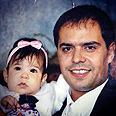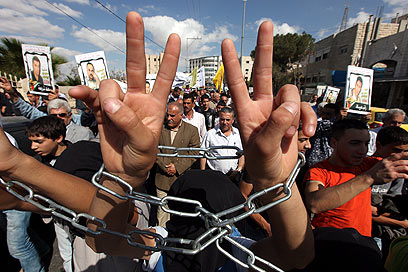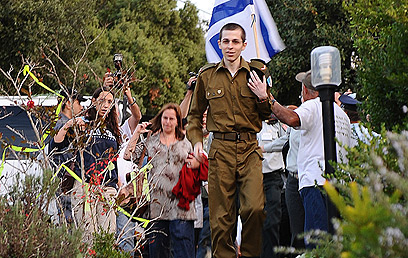
Terror victims' families enraged over prisoners' release
Families petition PM against imminent release of dozens of prisoners convicted of terror acts. 'We agreed to Shalit deal, but murderers belong in jail,' one says
"They are selling the country for nothing," Eilat Osher said when she heard her husband's killer, Abu Dahlia Hassan Atik Sharif, may be released in the course of the recently-announced peace talks.
Osher, whose husband Avi was stabbed and killed by Sharif in a date plantation in the Jordan Valley in 1991, added: "In the case of the Shalit deal, when the list of prisoners to be freed was released I felt uncomfortable to interfere with it because when I saw Gilad's parents' eyes, it devastated me. Today this isn't the case."
Related stories:
- Israeli ministers divided over peace talks' chances
- Landau: Consent to release prisoners – mistake
- 'Israel will soon halt settlement building, free prisoners'
The planned release of Palestinian prisoners drew fire from terror victims' families, who have been running a campaign over recent weeks to prevent such a step.

Palestinians demonstrating for prisoners' release (Photo: EPA)

Gilad Shalit returns home (Photo: IDF Spokesperson's Unit)
"I didn't know that the name of the murderer has been raised as one of those up for release," Osher said. "Even as it is, I'm constantly on edge with all the previous release attempts, but after the Shalit deal I thought we've braved through it.
"At the time, I was in contact with all the prime ministers, and I had a promise, starting with Yitzhak Rabin, that the murderer will not be released. My only consolation is that the murderer is in prison."
Osher added: "I will not rest until I stop his release. A murderer belongs in jail, no matter if he's a Jew or an Arab. Our family has been ruined and there's no reason for him to go free."
The planned prisoners' release also enraged Amnon Dolorosa, brother of David who was killed in 1988 when a firebomb was hurled on a bus he took in Jericho. He was injured while trying to save Rachel Weiss and her three children, who died in the attack, and later died of his wounds.
"It's very bad that people haven't realized yet that the prisoners go back to their terrorist activities and will return on the next round," Dolorosa said bitterly, and noted that two Palestinians jailed for their involvement in his brother's death have already been released.
"There are plenty of ways to hold negotiations and it's not only up to Israel to make overtures. Forgiving is impossible, and neither is forgetting. A person killed by a hateful act is an unnecessary loss. It's something we live with daily. He should serve out his full sentence – a woman and three children were burned, people were wounded, my brother who tried to help them was burned."
Sapir Hazut, 20, daughter of Daniel Hazut, who was killed by gunfire 20 years ago in a junction in Wadi Ara while working as a traffic policeman, found it difficult to understand the prisoners' release: "In the Shalit deal, my mother and I supported the release of my father's murderers, because the life of a soldier was on the line.
"But demanding to release these terrorists is without any purpose, since pardoning terrorists with blood on their hands completely contradicts the desire for peace. You don't make peace with murderers. We must examine ourselves as a society, if we forgive murder."
'Sending more innocents to be slaughtered'
Hazut, who plans to follow in her father's footsteps and join the police, added: "Even a life sentence isn't enough for such a crime, because even behind bars terrorists managed to lead a normal life. And now those who demand to release them are just sending more innocents to be slaughtered, because it is obvious they'll murder again."
The list of prisoners was given by Palestinian President Mahmoud Abbas to Israel through US State Secretary John Kerry, and should have come as no surprise. The prisoners, all jailed before the Oslo Accords were signed, have long been on the Palestinian agenda and Abbas claims their release was promised to him in the days of Prime Minister Ehud Olmert.
The demands for their release has gained new momentum after the Shalit deal, which saw the release of 1,027 prisoners. The most veteran prisoners on the list were jailed 30 years ago, and the least were jailed in 1994, with 55 coming from the West Bank, 24 from the Gaza Strip and 10 are east Jerusalem residents.
Over recent weeks, 18,000 people signed a petition published by the bereaved families, calling the prime minister not to release prisoners.
Notable prisoners on the list:
![]() Mahmoud abu-Harbish: Jericho resident, jailed in 1988 for his involvement in the hurling firebombs at a bus near his city that killed soldier David Dolorosa and Rachel Weiss and her three children.
Mahmoud abu-Harbish: Jericho resident, jailed in 1988 for his involvement in the hurling firebombs at a bus near his city that killed soldier David Dolorosa and Rachel Weiss and her three children.
![]() Mahmoud Issa: Resident of Anata, near Jerusalem, jailed since 1993. Was part of a Hamas cell that kidnapped and killed Border Guard officer Nisim Toledano in 1992. He also participated in a running-over attack of two soldiers.
Mahmoud Issa: Resident of Anata, near Jerusalem, jailed since 1993. Was part of a Hamas cell that kidnapped and killed Border Guard officer Nisim Toledano in 1992. He also participated in a running-over attack of two soldiers.
- Receive Ynetnews updates directly to your desktop











